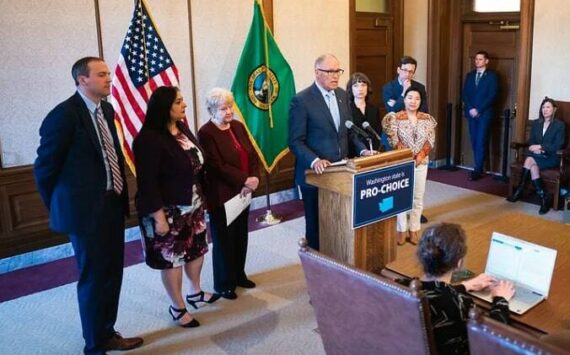This article was first published
in the Everett Herald.
Tim Eyman isn’t talking much about his latest initiative but the Mukilteo resident may benefit more than most if he’s successful.
It is I-517 and if approved by voters next month it will make the most significant changes in the state’s initiative and referendum process since the first citizen-inspired measure reached the ballot nearly a century ago.
It would provide more time to qualify measures, more protection for signature gatherers and more places to circulate petitions. It also would make it easier to get on the ballot in cities and counties where local initiatives are permitted.
“I-517 puts the citizen back in citizens initiatives,” said Eddie Agazarm, founder of a professional signature-gathering firm that’s worked on Eyman initiatives, and a spokesman for the Yes on 517 campaign.
But if this initiative passes, a courtroom battle may follow as opponents insist elements of the measure are illegal. They contend it will make it impossible for private business owners to bar signature gathering on their property or to decide where those with petitions operate.
“We believe in the referendum and initiative process,” said Jan Gee, chief executive officer of the Washington Food Industry Association and leader of the No on I-517 campaign. “But we don’t believe that freedom of speech rights should come at the expense of private property rights.”
What It Does
In Washington, there are two types of initiatives. There are initiatives to the Legislature, which first go to lawmakers who can approve them and avert a vote. If no action is taken, they continue onto the ballot.
And there are initiatives to the people. These are the ones that go directly to the ballot if sponsors turn in enough valid signatures and are the ones targeted for change under Initiative 517.
As written, I-517 would start the process earlier by providing an additional six months for collecting signatures.
It establishes new penalties for those convicted of interfering with the gathering of signatures. And it creates a new 25-foot buffer around signature-gatherers and anyone convicted of harassing them within that zone could face misdemeanor charges.
I-517 permits signature gathering on sidewalks and walkways in front of store entrances and exits, and inside or outside public buildings.
And cities and counties, which allow initiatives, will no longer be able to go to court to keep a measure off the ballot if the sponsors turn in enough valid signatures. Such court fights broke out in Mukilteo, Monroe and other communities after residents sought to ban the use of red-light cameras through initiatives.
At the Heart of the Debate
There’s been little controversy over adding protections for those who gather signatures and giving them a few more months to do their work. There’s not been a lot of angst expressed publicly on the ending of pre-election challenges to local measures, which is already the case with statewide measures.
The real debate is on whether passage of this initiative maintains the status quo for where signatures can be collected or not.
In its analysis of the measure, the Attorney General’s office found signature gathering “would be legally protected on public sidewalks and walkways and all sidewalks and walkways that carry pedestrians, including those in front of entrances and exits to stores, and inside or outside public buildings.”
Opponents say that means those with clipboards could show up at schools, inside sports stadiums or outside the front door of any store in the state.
“It takes away everybody’s freedom of speech except the signature gatherers. All of our grocers lose their rights to say who can be on their property and set the rules on where and when they can be there,” said Gee, whose trade association includes 383 retail stores.
Jason Mercier of the business-oriented Washington Policy Center said the “plain language” appears to expand existing laws.
“Based on the text of Initiative 517 and the lack of definition of important terms, such as ‘store’ and ‘public building,’ passage of the initiative would likely lead to lengthy court battles to determine whether its provisions infringe on constitutional property rights,” he said.
But Mark Baerwaldt, an attorney and spokesman for the Yes on 517, said Mercier and the rest of opponents are wrong. Existing law which spells out “reasonable time, place and manner” for gathering signatures won’t change, he said.
“It does not affect private property rights in any circumstance,” he said. “It’s great political spin, but it’s not related to I-517. They’re trying to make a legal issue a political issue and it’s not.”
Where’s Eyman?
Tim Eyman turned in signatures for Initiative 517 in January but disappeared from the scene soon after. He doesn’t return phone calls and redirects emails to Baerwaldt and Agarzam for comment because he said he’s busy working on a tax-limiting measure for 2014.
“Mark and Eddie are focusing on I-517. What I wrote in January, when we turned in the signatures for I-517, best summarizes why I support I-517,” Eyman wrote in a Sept. 26 email.
What Eyman wrote in January is that he enjoyed doing a batch of anti-red-light camera measures in 2010 and 2011 all of which landed in a courtroom at some point.
“I’m super supportive of I-517 because it ensures that no one else who sponsors an initiative will have to go through the nightmare we did,” he wrote. “And it allows me to continue to work with local activists who simply want to let their local voters decide if they want those obnoxious cameras or not.”
The No on I-517 coalition includes a few longtime philosophical allies of Eyman’s including the food industry group, and the Washington Retail Association. It also includes two of the state’s political heavyweights ex-Attorney General Rob McKenna, a Republican, and ex-Auditor Brian Sonntag, a Democrat.
Also fighting the measure is Andrew Villeneuve of Northwest Progressive Institute, a left-leaning think tank. Eyman is not involved in this campaign because he doesn’t want to be seen as promoting a self-serving initiative, Villeneuve said. He opposes the measure, because it would limit property owners’ rights.
“This isn’t about petitioning government,” he said. “This is about profit making and making sure paid out-of-state signature-gatherings can exercise their full rights while others can’t exercise theirs at all.”
Jerry Cornfield is the Herald’s Olympia bureau chief.








